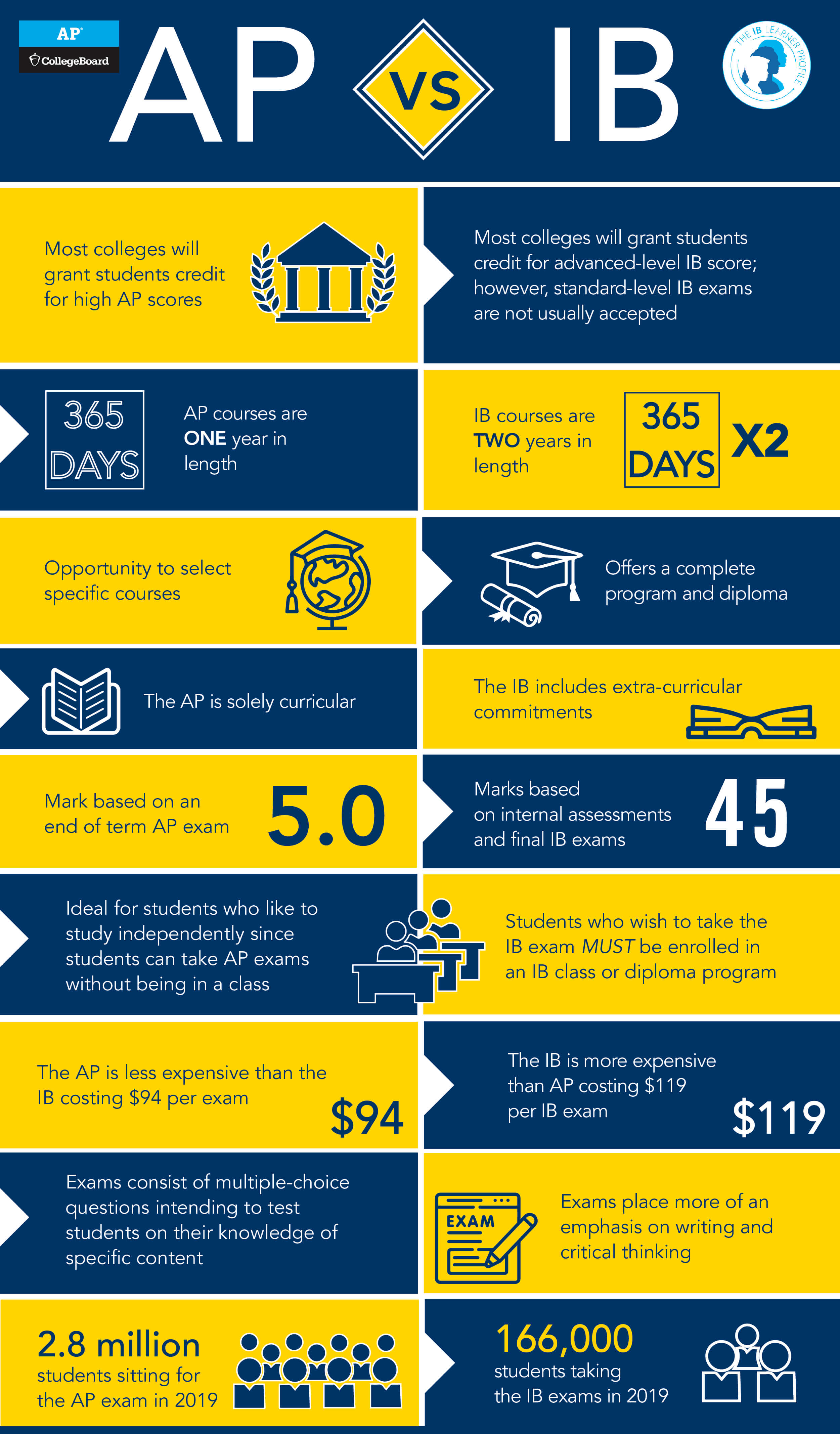IB VS AP: DISCOVER THE DIFFERENCES
Both Advanced Placement (AP) and International Baccalaureate (IB) programs offer your children the opportunity to undertake college-level coursework in high school with a chance to earn college credit and advanced placement. Both are rigorous, high-level programs with academic requirements that are more demanding than those found in a typical high school curriculum.
But is one better than the other? How are they different? Do they have any similarities? And do colleges and universities prefer one over the other? Which one poses the greatest benefits to your children?
To address these questions, we’ve enlisted the help of outside sources and experts within the Concordia International School Shanghai community to give an in-depth look at each of these powerhouse programs.
Would you like more information about Concordia’s approach to learning and how it will benefit your children?
What is AP?
The AP Program is offered by the College Board, the organization which develops and administers the SAT, the standardized college admission test for the U.S. and Canada. The program offers courses covering a range of subject areas.
AP courses are single level, and therefore, provide enough flexibility for students to take any combination of courses depending on their schedules and goals.
At Concordia, our AP Program is rigorous and gives our students a taste of what they will face in university. Though the courses are elective, students who demonstrate interest and initiative in related subjects prior to selecting the AP, are encouraged to consider taking the program.
Learner Profile of an AP Student
What exactly does it take for your children to thrive in an AP program? What characteristics do they need to embody?
“An AP learner enjoys an academic challenge, and is not afraid to work hard. They are prepared to handle high-level academic content successfully and are disciplined enough to manage their personal life and their social life, with the requirements and rigor of college-level demands. They are invested in their future and are often willing to make sacrifices to achieve their academic and professional goals,” says Monica Ghicu, AP Coordinator at Concordia.
Students who choose to study the AP are:
- Empowered to be lifelong learners
- Adaptable and independent thinkers
- Globally minded and have the ability to make connections
- Academically ethical
- Inquiry driven
- Motivated and dedicated to school work, extra reading, and research
- Responsible individuals capable of multitasking, prioritizing activities, and working to a deadline
- Prepared and organized
- Proficient in reading and writing
Click here to discover more about an AP learner.
What is IB?
The IB program is designed as an internationally recognized diploma with a prescribed program of courses.
There are four programs that cater to students from ages three to nineteen, each with specific requirements for completion.
The IB Diploma Program (DP) is the one typically offered to students at the high school level. Students may choose to take IB courses without signing up for the full IBDP; however, in order to earn the IB diploma, they must complete a set number of courses covering a range of subjects at advancing levels.
What are the Benefits of IB?
Both the IB and the AP are exceptional programs that will help your children excel.
“IB World School students develop strong academic, social and emotional characteristics. They are also likely to perform well academically,” writes the IB website.
1. FOCUSES ON MORE THAN ACADEMICS
Rather than focus solely on academics, the IB gives students the opportunity to develop their personal and interpersonal skills.
In order to receive the IB diploma, students must write an extended, college-style research paper and complete extra-curricular requirements.
2. HELPS STUDENTS BECOME CULTURALLY AND GLOBALLY AWARE
Through the Creativity, Action, Service (CAS) program and the development of a second language, students not only have their eyes opened to global issues, they discover how they can help.
3. STUDENTS HAVE THE OPPORTUNITY TO RECEIVE UNIVERSITY OR COLLEGE CREDIT
In the IB, students can take both higher-level and standard-level courses. In order to get the IB diploma, students must take at least three higher-level courses. College credit is given to higher-level exams, but not for all standard-level IB exams.
What are the Benefits of AP?
“AP courses give students the opportunity to challenge themselves and grow in areas of interest or strength they have discovered.”
- Patrick Love, High School Counselor at Concordia Shanghai
It’s clear that both programs offer tremendous learning opportunities for your children, so why should you encourage your children to study the AP and why are we proud to offer such a rigorous program?
1. RECOGNITION FROM POST-SECONDARY INSTITUTIONS
According to the College Board, more than 90% of 4-year colleges and universities in the U.S. grant advanced placement, credit, or both for successful scores on AP Exams, and 85% of selective institutions report that a student’s AP experience favorably impacts admission decisions.
With regards to that same source, more than 3,600 universities and colleges worldwide recognize and award credit for AP.
The diploma received while studying the AP, the Advanced Placement International Diploma (APID), is also a globally recognized certificate for students with an international outlook.
2. PREPARES STUDENTS FOR THE ACADEMIC RIGOR IN POST-SECONDARY
The AP helps students thrive in university because it gives them a sense of the discipline and rigor required in highly academic, highly demanding undergraduate learning environments.
The program helps students develop a mindset allowing them to work through challenging academic content with ease, while also helping them develop time management skills, exceptional work ethic, and a strong love of learning.
Important Note: The AP is designed in such a way to prepare students for success mostly in U.S.-based colleges and universities.
3. GIVES STUDENTS FLEXIBILITY
Students can take the AP exam without being in a class, making it ideal for students who like to study independently.
Students also have more choice in their course selection for the AP since it’s not a complete program.
4. STUDENTS HAVE THE OPPORTUNITY TO EARN A COLLEGE CREDIT
One of the biggest advantages is that the AP gives students the opportunity to complete post-secondary level work while in high school and possibly earn a college credit.
Earning a credit in high school can offer students more flexibility in their course selection, once they are accepted to their university or college of choice.
“The AP offers students an academic knowledge basis, upon which they can continue to build throughout their undergraduate and graduate studies,” says Ghicu.
Which of the Two Curriculums Looks Best on a College Application?
In her article What's Better for You: IB or AP, College Expert Guide Halle Edwards of PrepScholar.com shares that when it comes to IB vs AP, colleges don’t necessarily consider one to be harder or more impressive than the other.
“Because of this,” she writes, “colleges – especially the most selective ones – just want to see you have taken the most challenging course load available at your high school. That means instead of worrying about IB vs AP, you should worry about taking the most rigorous classes your high school offers.”
Taking either AP or IB classes looks very good on a student’s college application because it shows they are choosing some of the most challenging courses within their high school’s academic program. “There is no real preference or benefit from doing one or the other,” writes Edwards, “as long as you do well in your chosen courses.”
How Does the AP Prepare you for College?
“The AP program, specifically The AP Biology and AP Chemistry courses, really prepared me well for my foundational science courses that were required in my undergraduate work as a pre-med student. I felt that the teachers I had at Concordia really helped me truly understand the concepts in those courses, and a really strong foundation in those concepts was incredibly important because they showed up over and over again throughout my educational career.”
- Katie Klammer, Concordia Shanghai alumna and Michigan State University College of Human Medicine alumna. She is currently doing her residency in Obstetrics and Gynecology.
“Certain AP subjects were definitely helpful when it came to studying law. AP Comparative Government and Politics, for example, had a unit dealing exclusively on the United Kingdom and taught me basically everything I needed to know for the first semester of one of the core law modules (public law). While my friends were struggling with understanding the concepts of parliamentary sovereignty, devolution and the legal sources of the UK’s unwritten constitution, I was able to understand everything that was going on.”
- Julian Chow, Concordia Shanghai alumna, studying law at King’s College London
Concordia Shanghai Students Thrive at American Universities
Read Some of Our Families' Stories
Sometimes the best way to see the benefits of a curriculum is by reading stories of the students who have been in your children’s shoes, who have studied at the school you’re looking into, and now are reaping the rewards.
Our new case study explores:
- The story of a Concordia Shanghai families
- Their time at Concordia Shanghai
- Their thoughts about both the AP and the overall American education
- How they feel both helped them in post-secondary.

